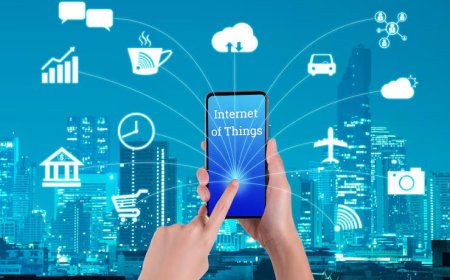AI Chips and Quantum Leap: Tech Innovations in 2025
AI-powered devices are reshaping everyday life in 2025, making homes smarter, routines easier, and decisions faster.
In 2025, the global tech ecosystem is advancing rapidly, driven by a mix of artificial intelligence, quantum breakthroughs, and chip-level innovations. From enterprise systems to consumer applications, changes are reshaping the way data is processed and applied. While some users look for cutting-edge processors, others turn to consumer gadgets like smartphones, wearables, or even lifestyle productssuch as salt nic vape juicethat now integrate smart functions. These tech leaps are interconnected, creating a seamless blend of physical and digital intelligence across industries.

AI Chips Are Changing the Game
AI-specific chips are no longer optionaltheyre essential. From cloud infrastructure to edge computing, these chips are enabling faster data processing, real-time analytics, and greater energy efficiency.
-
NPU (Neural Processing Unit): These processors are specially designed for handling machine learning tasks. They can process visual data, natural language, and complex algorithms more efficiently than traditional CPUs or GPUs.
-
Edge AI: AI chips embedded in edge devices (like drones, cameras, or industrial robots) allow for real-time processing without needing to send data to the cloud.
-
Data center upgrades: Tech giants are rolling out new AI chips with increased throughput to train large language models faster.
-
Customization: Companies are designing purpose-built chips for specific AI tasksmedical imaging, speech recognition, and logistics automation are common use cases.
These developments are speeding up AI model deployment across sectors like finance, manufacturing, education, and healthcare.
Quantum Tech Moves from Labs to Industry
Quantum computing is stepping out of the research phase. While large-scale commercial use is still evolving, 2025 is seeing clear adoption signs across industries aiming for specialized use cases.
-
Error correction improvements: One of the key challengesquantum error correctionis seeing progress, leading to more stable and reliable quantum results.
-
Quantum advantage zones: Finance, cryptography, material science, and pharmaceutical companies are exploring how quantum algorithms can outperform traditional methods in solving complex equations.
-
Hybrid computing: Companies are building systems that integrate quantum processors with classical computing infrastructure to balance performance and accessibility.
-
Global collaborations: Governments and private organizations are working together on national quantum strategies, investing in education, research, and hardware development.
Quantums evolution this year is not just theoreticalits opening the door to solving real-world problems that classical systems cant handle efficiently.
AI + Quantum = New Capabilities
The convergence of AI and quantum computing is one of the most exciting developments in 2025. By leveraging quantums computational scale and AIs pattern recognition abilities, systems can now explore more complex datasets and optimize outcomes in previously impossible ways.
-
Quantum machine learning (QML): Algorithms developed for quantum environments can process large, unstructured data faster than traditional AI systems.
-
Drug discovery: AI helps identify potential molecular candidates, and quantum models predict behavior at the atomic level.
-
Climate modeling: Hybrid AI-quantum systems can simulate environmental changes across timeframes with better precision.
-
Supply chain optimization: Quantum-enhanced AI systems are helping global businesses route goods more efficiently by solving combinatorial problems faster.
These integrations are expected to transform industries where complex modeling and decision-making are central.
Chip Innovation Beyond AI
AI isnt the only domain benefiting from chip evolution. Chips designed for high performance in specialized areas are gaining traction in several verticals:
-
RISC-V architecture: Open-source chip design is gaining popularity for its flexibility and customization.
-
Photonic chips: These use light instead of electricity, allowing for faster data transmission and lower energy consumption, especially in data-heavy industries.
-
3D chip stacking: This technique increases performance by vertically layering components, which reduces signal delay and improves energy efficiency.
-
Secure processing units (SPUs): These chips are built with security in mind, useful in sectors where encryption and data privacy are non-negotiable.
Chip diversity is expanding in 2025, with many startups focusing on specialized designs for fields like biotech, AR/VR, space tech, and finance.
Where Consumer Devices Fit In
Even though AI chips and quantum tech sound like enterprise-level tools, consumer products are beginning to benefit too. Smartwatches use AI chips to detect health issues. AR glasses combine edge AI chips with spatial sensors for real-time overlays. Even in lifestyle categories, devices are incorporating AI for better user experience.
For example:
-
Smart appliances that learn usage patterns and reduce energy waste
-
Fitness trackers that suggest workouts based on biometric trends
-
AR wearables that assist in home repair or cooking
-
Voice assistants that now understand complex, multi-step commands more accurately
All of these rely on chip and software improvements happening under the hood, making the tech experience smoother and more intuitive for end users.
Future Outlook and Accessibility
2025 is also seeing a trend toward accessibility. AI chips are being made smaller, cheaper, and more power-efficient. Open-source platforms like RISC-V are enabling universities and small startups to experiment without high licensing costs. On the quantum front, cloud-access models are letting companies use quantum power without owning the hardware.
-
AI democratization: Low-code tools and embedded AI platforms are helping small businesses automate operations.
-
Quantum cloud services: Providers like IBM, Google, and startups are offering remote access to quantum processors.
-
Education and upskilling: New certification programs are making it easier for professionals to pivot into AI or quantum roles.
Innovation is no longer confined to big corporationsstartups, researchers, and even hobbyists are contributing to a fast-moving ecosystem.
Final Thoughts
As we reach the second half of 2025, AI chips and quantum advancements continue to unlock new tech horizons. From improving machine intelligence to transforming logistics, medical research, and computing architecture, these technologies are setting the tone for the next decade. The synergy between quantum models and AI chips is particularly promising and may become foundational for future platforms.
Whether youre someone tracking enterprise infrastructure or exploring best vape flavors with integrated smart features, the influence of these technologies is impossible to ignore. The coming months will likely bring even more breakthroughsmaking it an ideal time to stay informed, experiment, and engage with this evolving landscape.




























